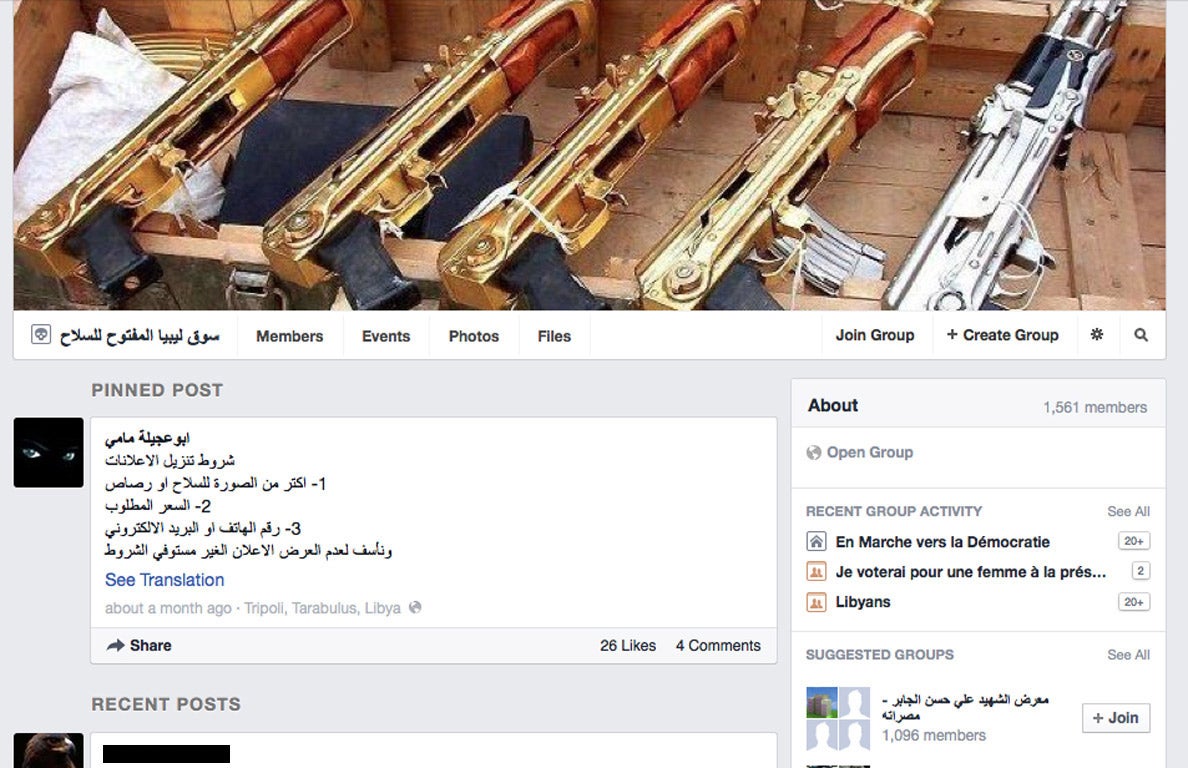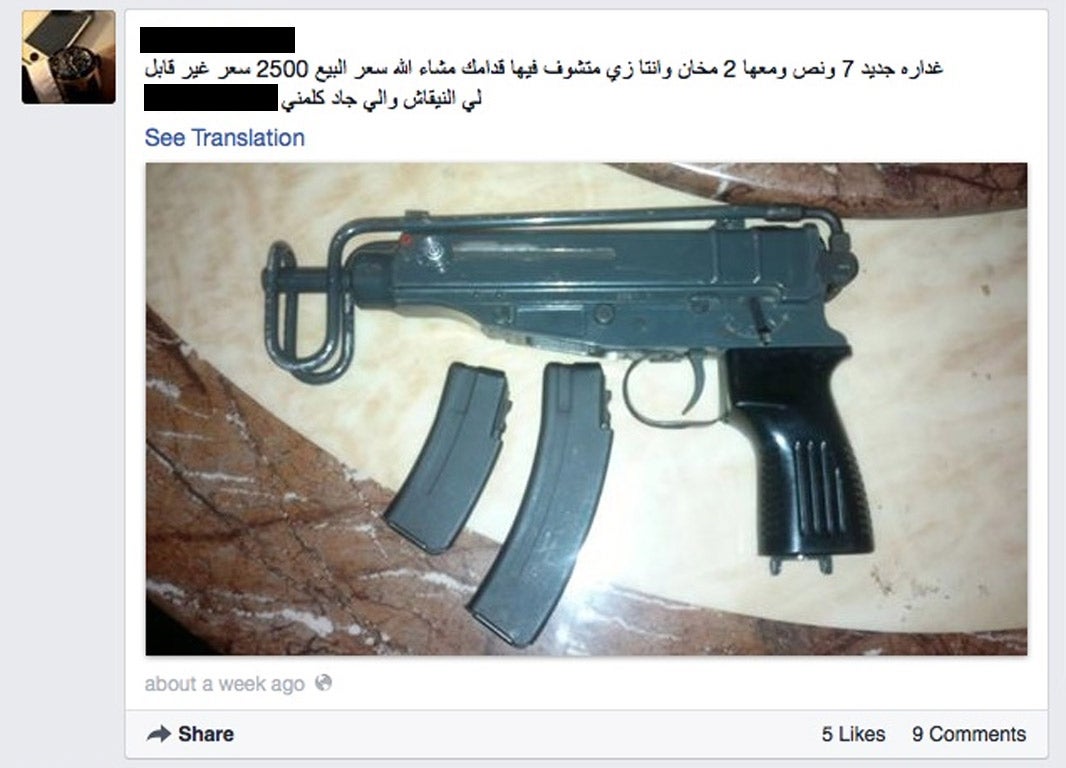The deadly network: Revealed - guns for sale on Facebook
As Libya’s Prime Minister asks Britain for help in ridding his country of weapons, The Independent discovers a flourishing online arms market
Your support helps us to tell the story
From reproductive rights to climate change to Big Tech, The Independent is on the ground when the story is developing. Whether it's investigating the financials of Elon Musk's pro-Trump PAC or producing our latest documentary, 'The A Word', which shines a light on the American women fighting for reproductive rights, we know how important it is to parse out the facts from the messaging.
At such a critical moment in US history, we need reporters on the ground. Your donation allows us to keep sending journalists to speak to both sides of the story.
The Independent is trusted by Americans across the entire political spectrum. And unlike many other quality news outlets, we choose not to lock Americans out of our reporting and analysis with paywalls. We believe quality journalism should be available to everyone, paid for by those who can afford it.
Your support makes all the difference.On a late July day in downtown Tripoli, a young man steps into a car idling next to the Libyan capital’s iconic Martyrs’ Square. From the back seat, he hands to the driver what Libyans refer to as a “Turkish pistol” and some bullets. In return, the driver hands him a thick stack of 10-dinar notes. The exchange had been arranged using one of the numerous Facebook “groups” created in recent months to link gun-sellers to gun-buyers through the social network.
The driver, Muhammad, an unemployed, 23-year-old Tripolitanian, is one of hundreds of Libyans who are taking advantage of a security vacuum in a country awash with weapons nearly two years after its successful revolution removed a dictator.
It is these weapons that Libya’s prime minister, Ali Zeidan, asked for help in removing from his country while on an official visit to Britain yesterday. After meeting with David Cameron, Mr Zeidan called the mass of Gaddafi-era weapons an “international matter” and asked for assistance in disposing of them.
His plea came just a day after the UN Security Council warned of a “worrying” growth in the movement of weapons and ammunition across Libya’s borders “and an increasing number of reported cases of trafficking in such material to Syria”.
The growing prevalence of such underground arms markets is a sign that although the war may be over, stability is a long way off.
Muhammad, who asked that his real name not be published because of potential legal consequences, explains that he found the pistol advertised on on a Facebook page. Muhammad wrote under the “comments” section of a post, which included a photograph of the pistol, his phone number and that he was interested in purchasing the gun. He says that the vendor’s original posting indicated that the vendor could deliver the pistol anywhere in Libya, suggesting an organised entity behind the sale. Muhammad received a call a few days later to confirm the deal, and a delivery boy showed up that day in July in the centre of Tripoli with the gun.
“Anyone who upsets me or threatens me, if he gets really bad, I’ll kill him,” responds Muhammad when asked why he purchased the gun.
During Libya’s revolution against former dictator Muammar Gaddafi, Nato assisted fighters by enforcing a no-fly zone and co-ordinated with rebels to strike Gaddafi’s military targets. While an October 2012 study by the Geneva-based Small Arms Survey found that most of the revolutionaries’ small arms were captured from Gaddafi’s forces, Nato countries also sent arms shipments, in some cases directly and in others indirectly.
The French military admitted that it air-dropped arms in Libya’s western mountains, while the US secretly gave its blessings to Qatar to ship arms. Individual small-arms ownership has since skyrocketed in Libya, and the Small Arms Survey notes that in the town of Misrata alone, “conservative estimates put the total small arms… at more than 30,000”.

Yet it is the leftover revolutionary brigades that are in possession of real arsenals. The current Libyan government has failed to bring these brigades fully under the control of the government, either as a national army or a national police force. While large brigades are nominally under the control of the Interior Ministry or Justice Ministry, it is clear that they do not take orders from a government that they do not fully trust.
Neither these large, independent brigades nor the government have been able to stop the increasing crime and violence carried out in the streets of Tripoli and Benghazi by smaller armed groups and militias that formed after the revolution. Rumours abound that some armed groups are acting like mafias by facilitating the trade of illegal drugs and alcohol.
There are also reports that some militias are using their access to weapons and their privileged positions to trade in small arms. While it is difficult, and perhaps dangerous, to verify these allegations, there is evidence that Libya’s militia problem has at least added to the insecurity of gun stockpiles.
Although Muhammad only purchased a 9mm air-powered pistol modified to fire copper bullets, numerous larger guns are on sale on Facebook’s Libyan arms market. The Independent found at least five groups openly stating their purpose as a channel connecting gun vendors to gun purchasers. A Kalashnikov was advertised for 1,100 dinars, or about £560. Entire arsenals, including rockets and bullets, were also on display.
More worrying for those responsible for Libya’s security is that some of the arms dealers on Facebook claim allegiance to powerful militias. One arms dealer that advertises guns on several Facebook groups goes by the moniker Strong Heart. On Strong Heart’s profile page, he writes that he is a General in the Qa’Qa’ Brigade, a well-known militia linked to revolutionary fighters from the western mountain town of Zintan. One of the few “closed” groups, Gun Vendors Market in Libya, has an administrator whose profile name is Zastavia AK. AK’s profile says he is a member of the Zawiya Martyrs Brigade.
The Independent alerted Facebook that its pages were being used to sell guns, and provided URLs of two of the groups. One of the URLs provided was that of Gun Vendors Market in Libya, which included more than 1,500 members and whose description read: “Selling, buying, display, advice.” Within a few hours, a Facebook employee responded that these pages “absolutely broke our rules and have been removed.” But while these groups were indeed removed, others remain.
“We were made aware of this particular pattern of usage of Facebook when you contacted us. That led to the review of the content against our standards,” Richard Allan, Facebook’s director of policy for Europe, the Middle East and Africa told The Independent.

Mr Allan explains that, except in the case of child abuse, Facebook does not have a proactive approach to policing posts from its more than one billion users worldwide. Instead, it has a multilingual team of hundreds of reviewers based in three centres located in the United States, Ireland and India.
“We essentially wait for [notification of] a policy violation,” Mr Allan says. “We don’t feel that there is a major content problem on Facebook because people are generally very well-behaved… Facebook users, they often act as a neighbourhood watch.”
As for using Facebook’s pages to buy and sell arms, Mr Allan says that this is the first time that he or his colleagues have seen such a phenomenon, adding that “it does seem to be very specific to the situation in Libya”.
As security deteriorates in a Libya that lacks trusted institutions, a strong state or government, and is saturated with small arms, some, such as Muhammad, feel the need to arm themselves.
Asked whether he’s used the gun yet, Muhammad responded: “No, I don’t have any problems, but I see lots of problems in the street. We’re fed up with weapons.”
Join our commenting forum
Join thought-provoking conversations, follow other Independent readers and see their replies
Comments